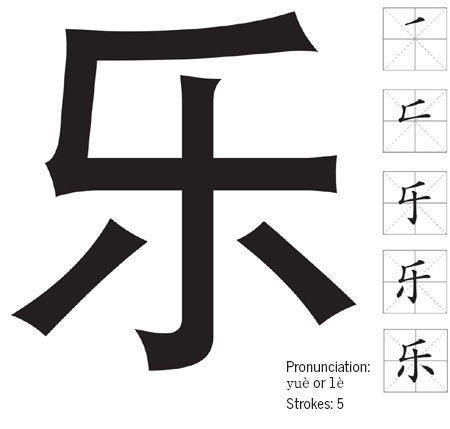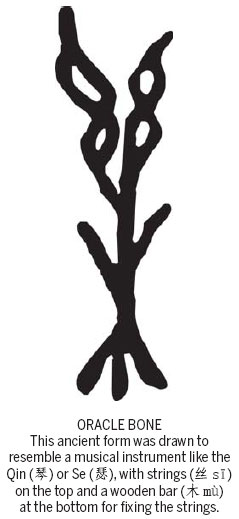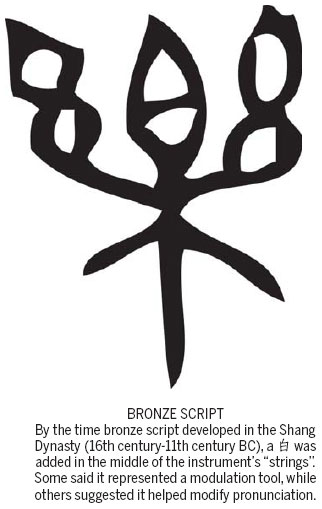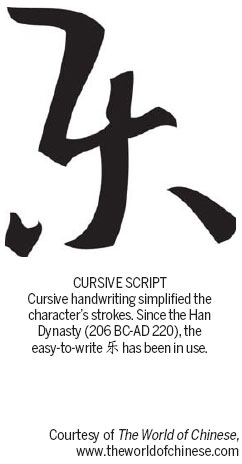Music, happiness walk hand-in-hand
Updated: 2012-09-28 10:34
By The World of Chinese (China Daily)
|
|||||||||||

音乐,自古就与快乐同行
Whether you prefer heavy metal dirges or delicate sonatas, music - as Confucius once said - is something that "produces a kind of pleasure which human nature cannot do without". (夫乐者,乐也,人情之所不能免也。Fú yuè zhě, yuè yě, rén qíng zhī suǒ bù néng miǎn yě.)
This universal language, which in Chinese goes by the name 音乐 (yīn yuè), first found written expression more than 3,000 years ago, when the earliest versions of the character 乐 appeared in oracle bone script, drawn to represent an instrument with strings on top and a wooden base on the bottom.
By the time bronze script rolled around, the character白 (bái) had been added between the two strings to represent a tuning device, to form 樂.
It's speculated that 白 also served a phonetic purpose, but that the pronunciation naturally evolved. 樂 may have been vivid, but it was also a pain to write, and during the Han Dynasty (206 BC-AD 220), quick and dirty cursive versions of the character simplified it to 乐.
It wasn't a great leap for the character 乐 to also take on the meaning of "happiness" by the Spring and Autumn Period (770-476 BC), as indicated by another Confucian quote, "When friends come from afar, isn't it a joy!" (有朋自远方来,不亦乐乎! yǒu péng zì yuǎn fāng lái, bù yì yuè hū!)
Of course, multiple interpretations of the same character gets confusing, which is why people decided to distinguish the meanings by their pronunciation. The "music" 乐 became pronounced as yuè, while "happiness" converted to lè.
In modern Chinese, 乐 is used in tons of musical words, like 乐器 (yuèqì, instruments), 器乐 (qìyuè, instrumental music), 声乐 (shēngyuè, vocal music), 乐队 (yuèduì, band), 乐谱 (yuèpǔ, score), 乐曲 (yuèqǔ, song), 乐团 (yuètuán, orchestra), 奏乐 (zòuyuè, to perform music), 民乐 (mínyuè, folk music), and so on.
Yet in the grand scheme of things, the number of 乐-words related to music are relatively few and simple in meaning. By contrast, 乐-words related to "happiness" are both abundant and complex.
A few examples include 快乐 (kuàilè, happy), 娱乐 (yúlè, entertainment), 乐观 (lèguān, optimistic), 乐不可支 (lè bù kě zhī, overjoyed), 乐极生悲 ( lè jí shēng bēi, out of extreme joy comes extreme sorrow), 极乐世界 (jí lè shì jiè, paradise), 幸灾乐祸 (xìng zāi lè huò, schadenfreude).
乐 can also be used in verbs to mean "to like" or "be willing to". For example, 乐此不疲 (lè cǐ bù pí), means to enjoy something and never get sick of it. 乐善好施 (lè shàn hào shī) means to take joy in doing good by others. 喜闻乐见(xǐ wén lè jiàn) means to love to hear and see, or to love to be entertained.
乐 can also be used as a noun to express pleasurable things. For example, 及时行乐 (jí shí xíng lè) means to have a good time while you can, while 寻欢作乐 (xún huān zuò lè) means to seek and indulge in sensual pleasures.
But 乐 doesn't always mean living large - it was Song Dynasty (960-1279) poet Fan Zhongyan (范仲淹) who urged, "Be the first to concern yourself with the affairs of state and the last to rejoice in personal happiness". (先天下之忧而忧,后天下之乐而乐. Xiān tiān xià zhī yōu ér yōu, hòu tiān xià zhī lè ér lè.) This socially responsible message leaves room both for selflessness and personal fulfilment - a sentiment that captures the essence of 乐.
In recent years, the 乐 family of words has adapted to include words referring to fun or comfort. 安乐窝 (ān lè wō) means "comfort zone", 安乐椅 (ān lè yǐ) is "easy chair" and 安乐死 (ān lè sǐ) means "euthanasia". That explains the vinyl release we recently found in the bargain bin: A Kevorkian Christmas: Carols for the Season.



(China Daily 09/28/2012 page27)
Today's Top News
Rescuers race against time for quake victims
Telecom workers restore links
Coal mine blast kills 18 in Jilin
Intl scholarship puts China on the map
More bird flu patients discharged
Gold loses sheen, but still a safe bet
US 'turns blind eye to human rights'
Telecom workers restore links
Hot Topics
Lunar probe , China growth forecasts, Emission rules get tougher, China seen through 'colored lens', International board,
Editor's Picks

|

|

|

|

|

|





